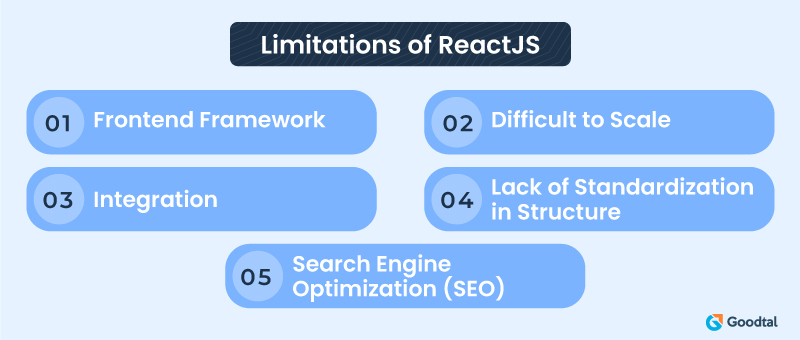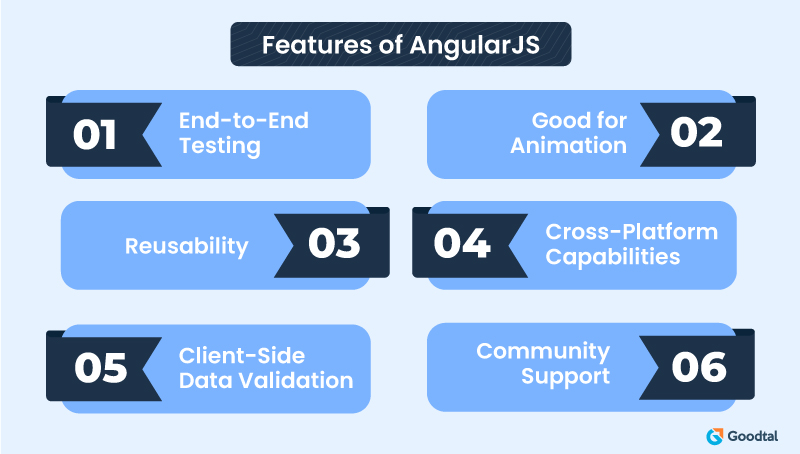
Software developers and web developers have a vast variety to choose from when it comes to libraries and frameworks for building applications. This, although a privilege, can put developers in a dilemma when they have to decide on the technology, libraries, or framework for their project. A successful application is a result of this choice, and so, do it cautiously!
There are numerous frameworks and libraries available for software development and web development. It is not rational to discuss all of these here. So, through this blog, we aim to discuss ReactJS development and AngularJS development and draw some comparisons to help you choose the right technology stack for your next project. To maintain a flow, we will focus on each, one by one!
Let’s start with ReactJS!
ReactJS
ReactJS is a JavaScript Library, suitable for building a wide range of web applications. It is a frontend library that helps develop creative user interfaces. This implies that its scope is limited to frontend development only and developers must build the backend using another compatible technology.
ReactJS development companies, however, feel that it is feasible to leverage the capabilities of ReactJS focused frontend development, while developing backend with another set of tools or libraries best suitable for the domain.
Let’s dig deeper into the features of ReactJS to understand it better.
ReactJS Development - Features
Compatibility
ReactJS is compatible with a variety of browsers, thus making it lucrative for developers.
Dynamic Web Applications
In these times of competition, personalization and customization are crucial for a successful web application. Apart from that, the interactive application ensures that users are engaged better. ReactJS can be used to develop interactive user interfaces so it is a popular choice for developers who want to deliver engaging and powerful user interfaces.
Limitations of ReactJS
Frontend Framework
ReactJS is a popular frontend development framework commonly used for building high-quality user interfaces. We can clearly imply that it is not used for backend development. So, developers will need a different framework for the backend while they are using ReactJS for frontend development. This also suggests that they will need to look into the compatibility issues for quality outcomes.
However, it is a common practice now to use a different framework for backend and frontend development especially when so much focus is on user experience and user interface design. So, developers can take it easy!
Difficult to Scale
Businesses commonly opt for scalable technical solutions as the scaling needs generally vary with time, popularity, and market conditions. Moreover, everyone plans for more users and more interactions as these are parameters for app success. Is scalability possible or convenient with ReactJS? Let’s answer this question!
Managing the state, interactions, and data flow in the application becomes challenging with increased application scaling. Also, the flow and synchronization of data across components becomes more complex as the application scales.
It is furthermore difficult to manage performance with ReactJS for a huge-scale application. Considering all of these, as ReactJS is difficult to scale, it is not a good choice for large-scale applications or those that may require scaling at a later stage.
Integration
It is actually applicable to many frameworks that successful third-party integration of tools and technologies causes a lot of wastage of time, costs, and human resources. And, it increases complications when version upgrades of such integrations cannot perform well with each other. ReactJS is no exception!
ReactJS is difficult to integrate with some web services as well as backend databases. However, it provides API to integrate with Angular and Vue.js. So, if you are planning to use the technologies it can’t integrate with, you must reconsider the choice of ReactJS.
Lack of Standardization in Structure
On one hand, the flexibility of application structure is a plus in ReactJS, but it becomes a limitation later when developers have structured the application in varied ways. The project becomes complex to maintain or hand over to new developers as they will need time to comprehend and adjust to the structure of the application.
The top ReactJS developers understand the best practices in ReactJS development and they develop applications with optimized structuring and comprehensive documentation. This can help reduce the challenge!
SEO
As such, ReactJS wasn't developed with search engine optimization focus. It uses JavaScript for rendering content. Search engine takes longer to index JavaScript pages compared to HTML.
Addressing search engine optimization concerns with client-side rendering is not easy with ReactJS. However, optimization techniques can help this to some extent! Most experienced ReactJS developers have configured themselves for such practices and so do not take it very seriously!
Well, that was about ReactJS. Now we will discuss AngularJS, its features, and limitations.
AngularJS
AngularJS is an open-source, structural framework commonly used for building single-page applications and dynamic web applications. It facilitates organized coding with Model-View-Controller architecture that allows automatic data synchronization between the model and view layers. This makes it easy to implement real-time UI updates with changes in data. These and many more features of AngularJS make it one of the preferred frameworks for developers.
Features of AngularJS
End-to-End Testing
AngularJS has all the tools and libraries for supporting unit testing and end-to-end testing of complex applications.
Good for Animation
Animation is a significant component of interactive applications that incite engagement. AngularJS is good for developing interactive interfaces as it supports creating animation and transitions in applications.
Reusability
AngularJS follows modularity and thus enables reusability. This makes AngularJS applications extendable and maintainable. AngularJS code is well-organized, readable, and easy to manage in large applications.
Cross-Platform Capabilities
AngularJS supports cross-platform development.
Client-Side Data Validation
Developers have long focussed on data integrity capabilities in applications. Data validation thus continues to be a significant feature of quality applications. AngularJS offers form validation at the client side, thus preserving the data integrity on the server.
Community Support
Most developers irrespective of how experienced they are need support at some stage of application development, especially when they are trying to build some innovative features. It is not usually possible to have a lot of in-house support for such situations as most AngularJS development companies optimize their teams to avoid resource wastage. Thus, the support has to come from external sources, and, as we know, this applies to software development companies, mobile app development companies, or web development companies.
AngularJS is supported by a vast community for developers to rely on when they need some help with troubleshooting. Developers can also share knowledge, experience, or suggestions pertaining to complex applications, including third-party integrations and other resources for development.
Suggested Reading: 5 Emerging Trends and Stats on Software Development
Limitations of AngularJS
Difficult for Beginners
AngularJS is comprehensive and includes different modules and services. It is thus difficult to grasp for beginners who can’t even understand its full potential or leverage it. However, for focused AngularJS developers, it cannot be said to be challenging.
SEO
Search engine optimization is a challenge for AngularJS applications as well. However, it is possible with pre-rendering or server-side rendering practices. The point is, whether it is feasible to go for such frameworks when better options are available. The answer is simple! You must decide based on your requirements. If AngularJS still fits your project requirements and if you can accommodate alternatives or strategies for SEO, go for it!
Debugging
AngularJS follows a complex architecture of nested components, directives, and services. This poses a challenge in debugging especially for complex applications.
Version Upgrades
Upgrading to the newer versions is often a challenge with AngularJS as it causes compatibility problems. However, this can be managed with better planning and careful execution.
Large File Size
AngularJS development leads to larger file sizes which can worsen the application’s loading time and consequently its performance.
Lack of Flexibility
The structure of AngularJS restricts developers’ freedom to choose libraries or tools. So, those who want to explore the best tools and libraries for developing an advanced application do not go with AngularJS.
Suggested Reading: Are You Prepared for the Challenges in Software Development?
Difference Between ReactJS and AngularJS
Developers’ circles discuss different frameworks and libraries. All of us obviously want to go with the best as the application performance depends on the tools, frameworks, and resources used for development. This comparison of ReactJS and AngularJS should help us choose better.
Scope & Architecture
ReactJS library for developing user interface components handles the view layer of the frontend application. AngularJS, on the other hand, is a complete and well-defined framework with MVC architecture. Thus, the scope of AngularJS is larger.
Languages Used
ReactJS uses JavaScript language while AngularJS uses TypeScript.
Data Binding
One of the prominent differences between ReactJS and AngularJS is in data binding capabilities. ReactJS offers one-way data binding that results in high performance. AngularJS allows one-way as well as two-way data binding flexibility to developers. However, this challenges performance.
Ease of Learning
ReactJS is easy to learn as most developers are conversant with JavaScript. JavaScript has existed for a long time and has long been almost inevitable for web developers to learn. AngularJS is more comprehensive like TypeScript, and so developers need time to learn and understand its large scope and potential.
Wrapping Up!
ReactJS and AngularJS are both well-known and widely used among developers worldwide. This blog was an attempt to familiarise you with these and offer a basic comparison between the two. However, we believe that the choice of technology stack should strongly depend on your specific requirements as no particular library, tool, or framework, fits all sizes.
Hope the above helps! However, you must focus on the right developers if you want a successful application. And, as you know already, its better to go with technology-specific developers experts in the chosen domain. So, the best ReactJS developers or the top AngularJS developers can build a perfect solution for you. Goodtal can help you find such service companies!


